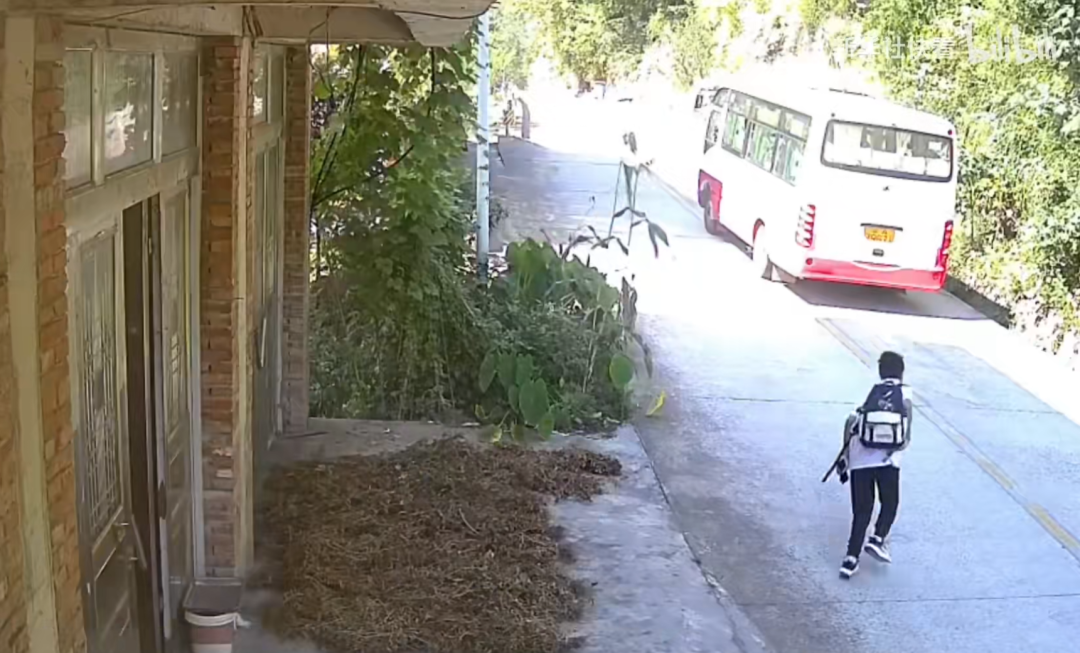
A simple honk (汽车喇叭声) from the bus is one part of a secret code between the driver and students living in a remote village in Wanzhou district, Chongqing city.
Noticing a schoolbag hanging on the door of an old house along his route, the bus driver pulls over and honks to answer the “code”. After a moment, he leans out of the bus and shouts a loud reminder. A boy then rushes outside and gets on the bus.
The boy’s parents work far from home, leaving him in the care of his grandmother. Despite this separation, the boy is determined to pursue his education, making the weekly journey to the city to go to school. He and the driver, Mr Cheng Lin, have developed a special routine. Whenever the boy’s schoolbag is hanging outside the house, it signals to Cheng that the young student needs to catch the bus. This simple interaction between the driver and the student became their shared “secret code”, a non-verbal way of saying, “Today, it’s time to go back to school.”
Mr Cheng, who has been driving the Luotian to Wuqiao Nan Station route for many years, shared his ideas on the matter. He mentioned that this rural route had a significant number of left-behind children due to their parents’ work experiences. Recognizing the importance of his role in their lives, he paid extra attention on Fridays and Sundays, the days when these children typically traveled back and forth to school.
Touched by the story, netizens (网友) praised him as a “good driver” and admired his promise to his young passengers. One netizen pointed out that “some people may not realize that the mountain road is so winding. A 15-minute bus drive may take at least an hour of walking...”. Another commented that “the schoolbag is their code, packed with love inside.”
1.Why does the boy hang his schoolbag at the door?
A To share with the bus driver some secrets.
B To tell the driver he needs to catch the bus.
C To show he is a student pursuing his education.
D To ask the driver to take his schoolbag to city.
解析:选B。B细节理解题。根据第二段的“Noticing a schoolbag hanging on the door of an old house...”和第三段的“Whenever the boy’s schoolbag is hanging outside the house, it signals to Cheng that the young student needs to catch the bus.”可知,男孩把书包挂在门上是为了告诉司机他需要乘车。故选B。
2.What does Mr Cheng Lin think of his role in the left-behind children’s life?
A It’s ordinary.
B It’s attractive.
C It’s important.
D It’s unnecessary.
解析:选C。C细节理解题。根据第四段的“Recognizing the importance of his role in their lives...”可知,程师傅知道自己在这些留守儿童生活中有着很重要的作用。故选C。
3.Which word can best describe Mr Cheng?
A Kindhearted.
B Generous.
C Creative.
D Determined.
解析:选A。A细节理解题。根据最后一段第一句的“Touched by the story, netizens praised him as a ‘good driver’ and admired his promise to his young passengers.”可知,网友们纷纷为这位司机点赞,称他是“重庆好司机”。故选A。
4.What can be learned from this text?
A The best fish swim near the bottom.
B Kindness can be found everywhere.
C Go to the sea, if you would fish well.
D If water is noisy, there are no fish in it.
解析:选B。B主旨大意题。根据全文内容可知,本文主要介绍了留守儿童与公交司机双向奔赴的爱,他们以书包为“接头暗号”,因此“善良无处不在”符合文意。故选B。